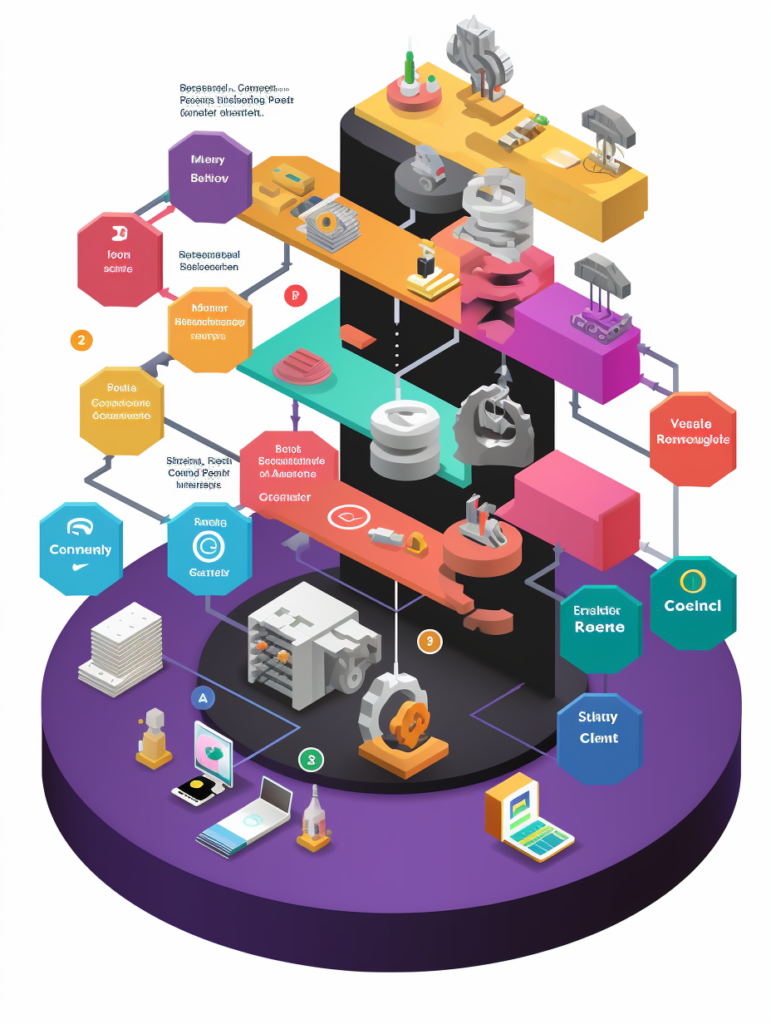DevOps has become an essential approach for building and operating cryptocurrency platforms. As cryptocurrencies grow in popularity and usage, the need for stability, security, and rapid iteration has made DevOps a necessity. In this article, we will explore why DevOps principles and practices are so important for cryptocurrency platforms.
Introduction to DevOps
DevOps is a set of practices and philosophies that focus on automating and integrating the processes between software development and IT teams. The goal is to enable faster software releases and updates, while ensuring high quality and system stability.
Some of the key principles of DevOps include:
- Automation – Automating repetitive tasks like testing, builds, and deployments.
- Continuous Integration and Delivery – Enabling frequent code commits and rapid iterations.
- Infrastructure as Code – Managing infrastructure through code for consistency and reproducibility.
- Monitoring and Observability – Insights into systems to enhance stability and uptime.
- Collaboration – Increased communication between teams like developers, ops, security.
By adopting DevOps, teams can ship higher quality software more rapidly, efficiently, and reliably.
What are Cryptocurrency Platforms?
Cryptocurrency platforms refer to the core software systems that power cryptocurrencies and blockchain networks. This includes the clients and nodes that make up the infrastructure of public blockchains like Bitcoin and Ethereum.
It also encompasses centralized exchanges, trading platforms, wallet services, payment processors and other applications in the crypto ecosystem. These platforms enable users to securely store, trade, and transact with cryptocurrencies.
Maintaining the stability, security, and seamlessness of these platforms is critical for mainstream adoption of cryptocurrencies.
The Importance of DevOps for Cryptocurrency Platforms
There are several key reasons why DevOps is crucial for cryptocurrency platforms:
Faster Innovation
With DevOps, new features and upgrades can be rapidly developed and released to marke. This enables cryptocurrency platforms to quickly adapt to user needs and competitive dynamics.
Enhanced Security
DevOps automation and procedures strengthen the security posture of cryptocurrency platforms. Tests can be run against infrastructure as code, and vulnerabilities can be detected earlier.
Improved Stability
Automated monitoring, logging, and observability give developers greater insight into systems. Issues can be flagged and resolved faster, enhancing uptime.
Higher Quality
With continuous integration and delivery, code changes are tested thoroughly before reaching production. This results in higher quality and fewer bugs.
Better Collaboration
Shared ownership between the development and operations teams results in better solutions. Security, operations, and business goals are built into processes.
Benefits of DevOps for Cryptocurrency Platforms
Here are some of the major benefits that cryptocurrency platforms can realize by adopting DevOps:
- Faster deployment of new features and fixes – With CI/CD pipelines, code can be rapidly built, tested, and deployed to production in an automated manner.
- Improved uptime and reliability – Automated monitoring and logging give visibility into production systems, enabling teams to resolve incidents quickly.
- Enhanced security – Infrastructure such as code, security scanning, and early feedback loops help identify vulnerabilities faster.
- Better cross-team collaboration – Shared ownership between devs, ops, security and others enables outcomes optimized across domains.
- Greater scalability – Automation and loosely coupled architecture allows platforms to scale up or down rapidly based on demand.
- Quicker recovery from failures – With automated rollbacks, immutable infrastructure, and chaos engineering, teams can recover faster.
- Higher customer satisfaction – Faster fixes, new features, and stability result in happier users and customers.
- More efficient use of resources – Automation, reduced waste, and shared knowledge multiply team productivity.
By leveraging these benefits, cryptocurrency platforms can dramatically accelerate their pace . of innovation.
DevOps Tools for Cryptocurrency Platforms
Here are some of the most popular DevOps tools used by cryptocurrency platforms:
- GitHub – Enables version control, code review, project management for software development.
- Jenkins – Leading open-source automation server for CI/CD pipelines.
- Docker – Containerization engine used to package and deploy applications predictably.
- Kubernetes – Container orchestration platform for automating deployment, scaling, and management of containerized applications.
- Terraform – Infrastructure as code tool that enables provisioning infrastructure through configuration.
- Ansible – Automation platform that can provision systems, deploy software, and orchestrate IT processes.
- Datadog – Monitoring and observability platform for gathering metrics, logs, and tracing data.
- Grafana – Visualization and analytics software for monitoring and metric dashboards.
- ElasticSearch – Search and analytics engine used for application and infrastructure logging.
Continuous Integration and Continuous Deployment (CI/CD) for Cryptocurrency Platforms
CI/CD is an essential DevOps practice for improving the release processes of cryptocurrency platforms.
Continuous integration (CI) automates the build, test and merge process for code changes. When developers commit code to a repository, it kicks off a CI pipeline. This runs automated tests, code scans, and packaging steps.
Continuous delivery (CD) takes the CI process further by automating the release of code changes to production. CD pipelines deploy code that has passed tests and scans into progressively more production-like environments.
For cryptocurrency platforms, CI/CD pipelines enable rapid cycles of development, testing, and release. Developers can ship high quality code frequently and safely, enabling faster innovation.
Security in Cryptocurrency Platforms with DevOps
DevOps strengthens the security posture of cryptocurrency platforms in several ways:
- Infrastructure as code – Managing infrastructure through declarative configuration files enables consistency, reproducibility, and built-in security by default.
- Automated security testing – CI/CD pipelines allow running static code analysis, vulnerability scans, and penetration testing tools with each code change.
- Immutable infrastructure – Replacing infrastructure through automated means rather than modifying them manually prevents configuration drifts and inconsistencies.
- Policy enforcement – Security and compliance policies can be enforced automatically through pipeline tools.
- Secret management – Securely managing access keys, certificates and passwords centrally rather than scattering them across environments.
- Monitoring and logging – Centralized aggregation of metrics, logs and traces makes it easier to detect and respond to security incidents.
By baking security into the entire software delivery process, cryptocurrency platforms can achieve higher security assurance.
Monitoring and Logging for Cryptocurrency Platforms with DevOps
Effective monitoring and logging are critical for cryptocurrency platforms to maintain high uptime and rapid issue resolution.
DevOps tools aggregate metrics, logs, and traces from across the technology stack into central dashboards. This provides development and ops teams full observability into systems and accelerated troubleshooting.

Key monitoring metrics for cryptocurrency platforms include:
- Node performance like CPU, memory, disk, and network usage
- Blockchain metrics like hash rate, block time, and gas usage
- Application metrics covering backend services, API performance, database, caching
- Business metrics like transactions, trades, and active wallets
Centralized logging of app logs, infrastructure logs, access logs and network logs enables rapid tracing of problems to their root cause.
Automation in Cryptocurrency Platforms with DevOps
Automation is at the heart of DevOps practices. For cryptocurrency platforms, automation brings major productivity and reliability gains.
Some examples include:
- Automated provisioning of cloud infrastructure to scale capacity up or down based on demand.
- Automated deployment of containerized applications across Kubernetes clusters.
- Automated rollbacks of bad deployments or failed updates through CI/CD pipelines.
- Automated execution of unit, integration, and performance tests with code changes.
- Automated policy enforcement for security, regulatory compliance, and operational best practices.
- Automated chaos engineering experiments to continually test system resilience.
Extensive automation enables cryptocurrency teams to focus their efforts on writing high-quality application code rather than performing manual operational tasks.
Challenges of Implementing DevOps in Cryptocurrency Platforms
Adopting DevOps also poses some key challenges for cryptocurrency platforms:
- Requires significant initial investment and leadership buy-in.
- Involves major cultural and organizational changes in processes and mindsets.
- Demands expertise in next-gen infrastructure, automation, and monitoring tools.
- Codebases and architectures may need re-design for automated testing and deployment.
- Additional complexity comes from microservices, distributed systems, service meshes.
- Harder troubleshooting and tracing issues through complex automation.
- Increased noise and alert fatigue from extensive monitoring.
However, when done right, the benefits far outweigh these challenges. Hiring experienced DevOps talent or working with skilled consulting partners is key.
Case Studies: Successful Implementation of DevOps in Cryptocurrency Platforms
Here are two examples of cryptocurrency platforms leveraging DevOps to enhance their capabilities:
Kraken – One of the largest Bitcoin exchanges adopted DevOps practices in 2014 to accelerate new feature development. By implementing CI/CD pipelines, infrastructure as code, and microservices, Kraken was able to grow 10X in 2 years.
Blockchain.com – A leading wallet provider managing over $20 billion in crypto assets underwent a multi-year DevOps transformation. Automation enabled 1-click deployments, while extensive monitoring gave deep visibility across 200+ microservices.
These case studies demonstrate the immense advantages cryptocurrency platforms can gain by embracing DevOps principles and culture. Though challenging, the effort pays off manifold through faster innovation, resilience, and market responsiveness.
Top DevOps Services Companies
Here is a comparison of the top DevOps consulting firms and service providers for cryptocurrency platforms:
| Company | Notable Clients | Strengths |
|---|---|---|
| Accenture | Bitcoin Suisse, Circle | Deep blockchain consulting experience, large talent pool |
| EPAM | Crypto finance & trading platforms | Skilled in capital markets IT & trading systems |
| Cognizant | Gemini, Paxos | Strong financial services background, crypto-native teams |
| Wipro | Crypto exchange platform | Broad IT services expertise, large offshore delivery capability |
| Infosys | Institutional digital asset platform | Experience with core banking systems, large IT consulting practice |
| HCL | Digital asset custody platform | Extensive infrastructure management services, growing blockchain practice |
| TCS | Cryptocurrency investing app | Global IT services provider, many financial sector clients |
| LTI | Crypto wallet mobile app | Strong mobile engineering, growing blockchain & DLT practice |
| Tech Mahindra | Crypto payment processing platform | Telecom domain expertise, blockchain CoE and partnerships |
| DigitalSuits | DevOps services company – is an innovative software development company that blends creativity and technology to craft seamless digital experiences and software solutions that drive business growth |
Specialized software product engineering DNA, early blockchain innovator |
In Conclusion
The implementation of DevOps holds the potential to greatly expedite the pace of innovation and fortify the reliability of cryptocurrency platforms. Through the automation of processes, the incorporation of comprehensive monitoring, and the enhancement of collaborative efforts, DevOps empowers teams to expedite the deployment of features while concurrently ensuring the stability of systems.
Nevertheless, it is imperative to acknowledge that reaping the rewards necessitates substantial investments, unwavering leadership commitment, architectural adjustments, the enhancement of team competencies, and the probable engagement of a seasoned consulting partner. The dedication and resources channeled into this endeavor yield substantial dividends in the form of hastened product-market alignment, heightened security, and augmented operational efficiency.
As cryptocurrencies continue their ascension into the broader realm of mainstream acceptance, it becomes increasingly evident that the incorporation of DevOps practices is destined to evolve into a business-critical imperative for both centralized and decentralized platforms, enabling them to seamlessly adapt to the unrelenting pace of transformation.
FAQs
Q: What are some DevOps best practices for cryptocurrency platforms?
A: Critical DevOps best practices include version control, CI/CD pipelines, infrastructure as code, monitoring & logging, test automation, and loosely coupled architecture.
Q: How can DevOps help cryptocurrency platforms scale?
A: DevOps automation, infrastructure as code, and containerization help apps scale rapidly. Kubernetes provides easy scalability by spinning up containers on demand.
Q: Does adopting DevOps require organizational restructuring?
A: Yes, DevOps needs aligned goals across dev, ops, security and re-skilling teams on new mindsets, processes & tools. New roles like site reliability engineers may be needed.
Q: Can DevOps help cryptocurrency platforms meet compliance requirements?
A: Yes, DevOps automation & policy enforcement helps meet standards like ISO27001, PCI DSS. Infrastructure as code provides auditable tracking of changes.
Q: How can DevOps improve security for cryptocurrency platforms?
A: CI/CD testing finds bugs early. Infrastructure as code prevents drift. Monitoring & automation detect threats faster. Secret management and policy enforcement secure keys.
Q: What are disadvantages of DevOps for cryptocurrencies?
A: Challenges include high initial investment, architectural changes required, cultural shift needed, increased complexity to manage, noise from extensive monitoring.
Q: Does DevOps introduce risks of downtime from frequent changes?
A: No, with proper test automation and rollbacks in CI/CD pipelines, DevOps enables more frequent changes while reducing downtime risk.
Q: Which applications benefit the most from DevOps in crypto?
A: Exchanges, trading systems, wallets, mining pools, and blockchain infrastructure benefit greatly from DevOps speed, resilience and automation.
Q: How can I get started with DevOps for my crypto platform?
A: Start small, pilot with non-critical apps first. Focus on version control, CI/CD, and monitoring initially. Work with experienced DevOps consulting partners for guidance.
With over a decade of experience in the publishing industry under her belt, Valeria Robasciotti is more than qualified to be the head of content and editor-in-chief at a prestigous publishing house. During her time working with books, she's edited and published hundreds of them. Even though she excels as being hardworking and an excellent manager, what she's most passionate about is reading and writing--which makes her even better suited for the job.



